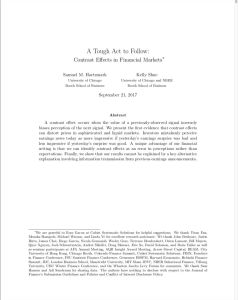Join getAbstract to access the summary!

Join getAbstract to access the summary!
Samuel M. Hartzmark and Kelly Shue
A Tough Act to Follow
Contrast Effects in Financial Markets
The BetaCodex Network, 2017
What's inside?
Investors’ previous observations of financial events may cloud their thinking about current situations.
Recommendation
Economists studying the machinations of markets have posited behavioral theories on how participants formulate their decisions. Rational expectations, adaptive expectations and the efficient market theory provide insights on the ebbs and flows of asset prices. But professors Samuel M. Hartzmark and Kelly Shue offer another vantage point on equity price fluctuations: “Contrast effects” occur when previous information creates a bias among investors. Traders, investors and analysts interested in exploring market behavior will find this a valuable report.
Summary
About the Authors
Samuel M. Hartzmark is a professor at the University of Chicago Booth School of Business. Kelly Shue is a professor at the Yale School of Management.

















Comment on this summary